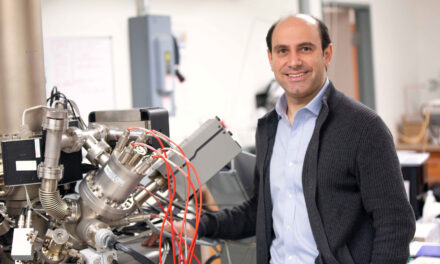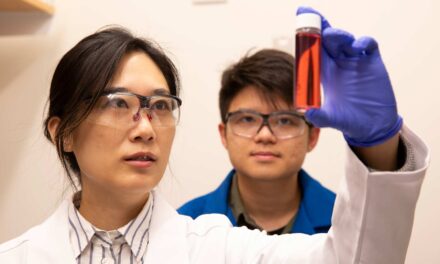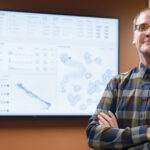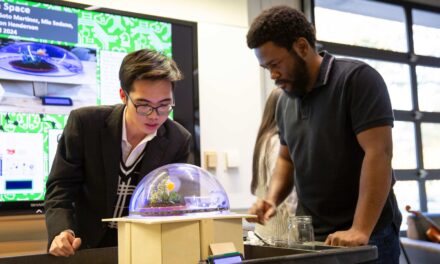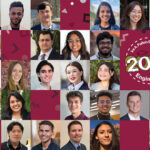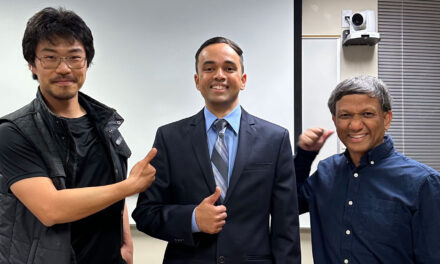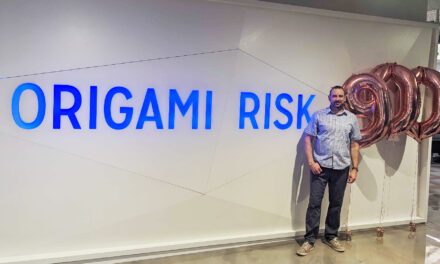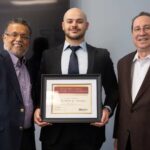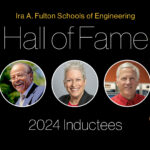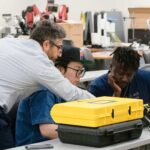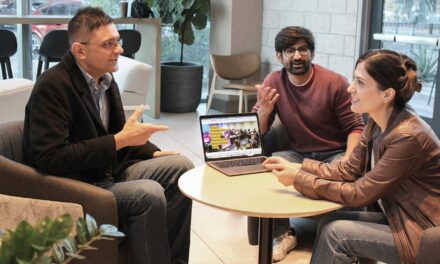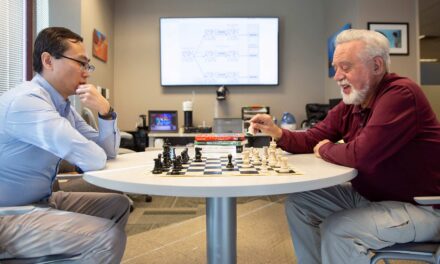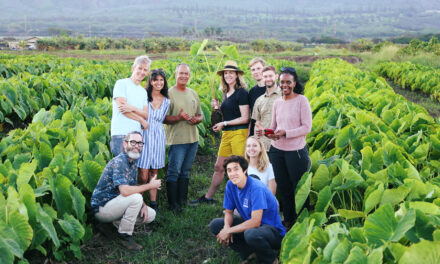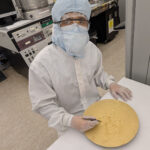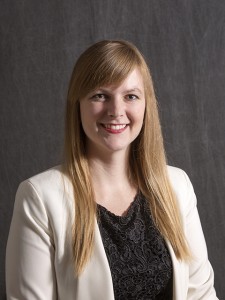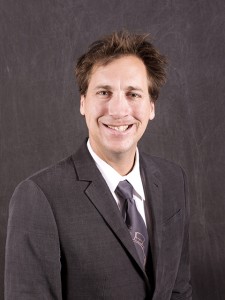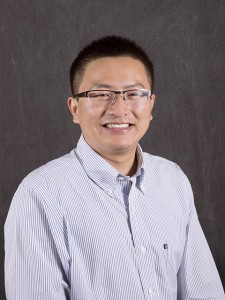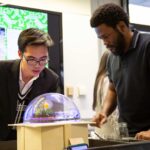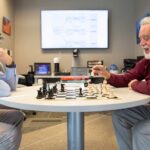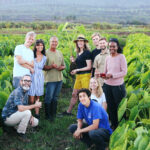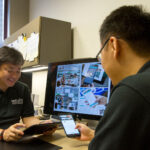
Research promising industry impacts draws science foundation’s support for ASU engineers
Science Foundation Arizona’s Bisgrove Scholars program is designed to help the state attract and keep outstanding academics and researchers with “the potential to transform ideas into great value for society.”
Three faculty members in the Ira A. Fulton Schools of Engineering at Arizona State University are now included among those promising leaders in their fields.
Heather Emady, Owen Hildreth and Yuji Zhao have been selected to receive Bisgrove Awards to support their research – giving ASU faculty three of the five Bisgrove Awards bestowed by the foundation this year.
Pursuing innovations in particle technology
Emady, a chemical engineer, is doing research on granular materials to make more effective use of them in a variety of industries – including mining, agricultural chemicals, consumer products, pharmaceuticals and chemical catalysts.
More than half of the sales in the world involve products for which granular materials are used in processing or are contained in the products.
“Despite their extensive use and their economic and environmental impacts, few engineering and design principles exist for these particulates,” says Emady, an assistant professor in the School for Engineering of Matter, Transport and Energy.
She will focus on advancing knowledge of the fundamental nature and properties of particulate materials, with the aim of developing methods to tailor the properties of these materials.
“If we can develop ways to control the properties of particulate materials, then we could actually predict these properties,” Emady explains. “That would lead to more efficient product and process design. Processing would require less money and energy, and less time and material would be wasted doing a lot of experiments.”
She will concentrate her efforts on particulate materials relevant to industries in Arizona.
Originally from the Phoenix area, Emady earned an undergraduate degree in chemical engineering at the University of Arizona and a doctoral degree in the field at Purdue University.
She did postdoctoral industrial research with Procter & Gamble, and later at Rutgers University as part of consortiums and centers focused on particle technology research in the catalyst and pharmaceutical areas.
Tools for printing electronic devices
Hildreth is developing new chemistries and techniques for microscale and nanoscale fabrication of complete microelectronic devices using simple inkjet-types printers – including microfluidic and microelectromechanical systems.
“Micro and nanoscale fabrication lacks these tools, and the facilities required to produce the devices cost millions or even billions of dollars. As a result, the number of companies participating in these areas is steadily shrinking as innovation becomes more expensive,” explains Hildreth, an assistant professor in the School for Engineering of Matter, Transport and Energy.
His research into nano-inkjet printing and reactive inks seeks to radically simplify fabrication of functional devices to enable small businesses to develop their own products at significantly less cost than those that must now be made by laboratory cleanroom-based techniques.
The reactive inks will enable an inkjet-style printer to print the layers of plastic, copper, silver, glass and other materials that make up the parts of electronic devices.
His Bisgrove Award will support his work to develop and improve reactive inks for printing copper, glass and nickel for applications in electronics manufacturing, photovoltaic technology and medical sensors.
Hildreth earned a doctoral degree in materials science and engineering from the Georgia Institute of Technology after getting a bachelor’s degree in the field at the University of California, San Diego. He spent five years working as a mechanical engineer designing consumer products.
Seeking breakthroughs in lighting
Zhao, an assistant professor in the School of Electrical, Computer and Energy Engineering, is working on advances in solid-state lighting based on light-emitting diode (LED) technology.
“With innovative engineering, LED lighting will provide significant energy savings, important environmental benefits and dramatic new ways to utilize and control light,” Zhao says.
His team is developing “smart” LEDs for wireless communications and medical applications.
The goal presents challenges, particularly technological limitations that cause LED devices to experience drop-offs in efficiency (called “efficiency droops”). Zhao’s team is creating lighting structures using new types of materials to produce “droop-free” LEDs.
Zhao is also leading efforts to develop LED-based “Li-Fi” communications technology to replace Wi-Fi technology that would provide faster, safer and more reliable wireless network connection.
In addition, he is exploring the potential of “smart” lighting to control the wavelength of LED-based lighting in a way that would enable it to aid the healing of wounds.
At certain wavelengths light has been shown to penetrate body tissue to a depth of about 10 millimeters, which is beneficial in treating problems close to the skin’s surface such as wounds, cuts, scars, trigger and acupuncture points, as well as infections.
A joint research venture between an ASU team and Mayo Clinic is being launched to develop safe concentrated LED sources that would be therapeutically effective without adverse side effects, Zhao says.
Zhao earned a bachelor’s degree in microelectronics at Fudan University in China and a doctoral degree in electrical and computer engineering at the University of California, Santa Barbara. He won a record four consecutive Outstanding Research Awards from the university’s Solid State Lighting & Energy Electronics Center.
His research on the semiconductor compound gallium nitride was recognized with a Most Cited Article of the Year Award from the research journal APEX (2012), an Editor’s Pick of the Year Award from the journal APL (2012), and was featured in more than 100 international news outlets.
Supporting transformative endeavors
Science Foundation Arizona seeks to diversify Arizona’s economy by linking industry needs with university research and ensuring the state’s education system produces a workforce trained to face the challenges of the 21st century.
“Arizona’s future is dependent on the ability to attract and retain the best minds in science and engineering,” said Bill Harris, the foundation’s president and CEO. “Bisgrove Scholars are synonymous with top-tier science and engineering research talent. This program and these select individuals have the ability to transform their fields of research into direct value not only for Arizona, but for all of society.”
The foundation’s Bisgrove Award provides winners $100,000 per year for two years to support their research endeavors.
To date the Bisgrove Scholar program has supported the work of 19 academic researchers, including seven at ASU. Read more about the Bisgrove Scholars.
Science Foundation Arizona has also supported other ASU research and K-12 education outreach, as well as graduate research fellowships for students pursuing advanced college degrees.
Contacts
Joe Kullman, joe.kullman@asu.edu
Media relations
480-965-8122
Ira A. Fulton Schools of Engineering
Pamela S. Garrett , pamela.garrett@asu.edu
Graduate Education
Senior Manager Graduate Programs
Graduate Academic Initiatives


